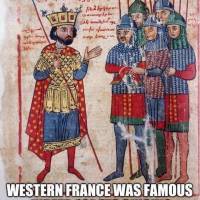A week or so ago a reporter on a radio show mentioned that in Homer’s Odyssey Penelope agreed to marry whoever could string Odysseus’ bow and shoot it through a dozen iron axe heads. In Homer’s epic, Odysseus leaves his kingdom in Ithaca to fight in the Trojan War. His people wait for him to return, but as years pass with no word from their king, many of his subjects become gluttons. They spend their time and energy consuming royal resources and having incessant orgies. As the reserves of royal wine start to run dry, they bicker among themselves and plot not only to take the throne from their king Odysseus, but his wife Penelope as well.
Odysseus hears of the rampant corruption in his court and returns to Ithaca disguised as an old man. He watches and waits for the right time to reclaim his rightful seat on the throne. Finally, a perfect time to reveal his identity and crush his opposition arises: Penelope announces that whoever can string Odysseus’ bow and shoot through 12 iron axe heads may have her hand in marriage.

Detail of Archer from 22v of Manuscript Codex Schürstab (Zürich, Zentralbibliothek, Ms. C 54) (Nürnberg, about 1472) image: e-codices
There is initial suspense when Telenachus, the son of Odysseus and Penelope, tries to win the competition. Though he has a hereditary claim to the throne and is worthy in a way, his winning the competition would create a tragically Oedipal scene. After Telenachus’ unsuccessful attempt, one of the lusty suitors, Leiodes son of Oinops, tries his hand at stringing Odysseus’ bow but “his hands were weak and unused to hard work, they therefore soon grew tired.”[1] Antinoos suggests warming the bow and greasing it up with lard to make is easier to bend. The audience holds their breath with squinted eyes, wrestling to find a comfortable spot on their seat as they worry that the villains may win by cheating.
At last, as the story goes, no one could do it except Odysseus. He strings the bow like an old bard automatically replaces a broken string on his lyre without skipping a beat. Odysseus then loads an arrow, draws back the string, and releases his missile like a bored teenager would pull and release the plunger of a pinball machine. Our hero shoots through all twelve axe heads with his first shot and boy does the king make heads roll after that!

Kevin (played by Ezra Miller) shoots up his school in Lynne Ramsay’s film We Need to Talk About Kevin (image copyright: 2011 BBC Films)
The next day, as I continued my way through Das Nibelungenlied on the bus, I ran across a passage that made me recall Odysseus’ bow and how he was the only one who could string it. Just before the scene where the hero Sifried is murdered in Das Nibelungenlied, the poet takes the time to describe the exceptional quality of Sifried’s hunting gear. The poet mentions that no man could bend Sifried’s bow but him:
“… And the huge bow he used
could not be bent by hand, except by him. Winding it
slowly back with a winch was all that anyone else could do.”[2]
Homer and the Nibelungenlied poet use the motif of the bow that could not be bent by anyone but the hero for different effect in their epic tales. Homer uses it to show the audience that his hero has no peer in strength and strategy and that his sovereignty should have never been a contest. Everyone in the audience knows that Odysseus is still awesome and that he is the rightful ruler of Ithaca. The Nibelungenlied poet uses the bow in the opposite way. He uses it to take his hero, who is already at the at the pinnacle of greatness, to an even higher point to make his fall all the more tragic. It’s like he rubs salt in a wound before it is even cut. Despite the fact that Sifried is so uniquely powerful that no one in the world but him is strong enough to use his bow, his greatest friends and allies will still betray him.
The bow in Homer’s Odyssey gives us a reason to cheer for his hero Odysseus, but Sifried’s bow gives us a reason to cry for the fallen hero of Das Nibelungenlied – just as a skald wants us to cry for Baldur when he tells us Norse Myth. While Odysseus’ bow allows the hero to bring justice back to Ithaca, Sifried’s bow reminds us that justice must be served. With Sifried gone and an audience hungry for justice, Sifried’s widow Krimhild seeks revenge…
[1] Homer, The Odyssey, ed. Samuel Butler, 21.2. available online: http://www.perseus.tufts.edu/hopper/text?doc=Perseus%3Atext%3A1999.01.0218%3Abook%3D22%3Acard%3D2
[2] Das Nibelungenlied, Trans. Burton Raffel (New Haven, 2006), verse 953, p.133











